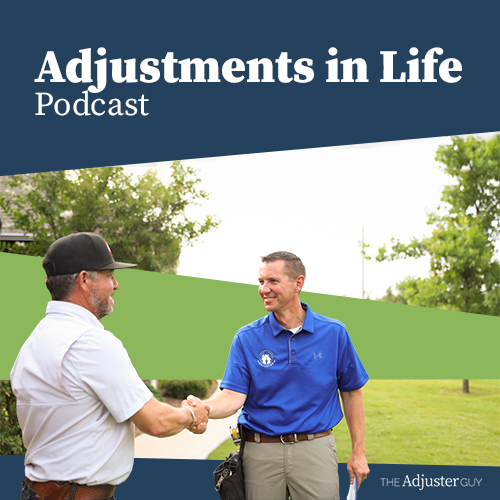Links
TAG Private Community: https://www.theadjusterguy.com/product-category/community/
Hipplock: https://hipplock.com/
Transcript
Alan Olson: All right. Welcome back again.
It is another Adjustments In Life Podcast Friday. How are you doing today, Jason?
Jason Dyson: Doing all right. Ready for these hurricanes.
Alan: Yes, me too. Man, it’s– I haven’t seen quite as much activity this year is what I’d like to see but hey, we still got a long ways to go.
Jason: Absolutely.
Alan: We’re not out of the woods yet and I don’t pray for devastation upon anybody but like I’ve said before, we all have a way to make a living and that just happens to be ours.
Jason: I just want to buy everybody a roof in a pool cage.
Alan: I understand and spend a fall in Florida, but you can’t beat that. Hey, the topic we’re going to discuss today for you folks, Jason and I had a recent conversation with a manager that works for one of the biggest IA firms or bigger IA firms in the industry.
He’s expressed to us that one of his biggest challenges in the industry today is adjusters understanding what an independent adjuster is and what an independent adjuster does.
Jason: Absolutely.
Alan: And so Jason and I got to think and let’s elaborate on that a little bit. Let’s bring some points forward and let’s define this little understanding what an independent adjuster is early on in the game and knowing what your responsibilities are?
As an independent adjuster can really turn directions in a positive way for you as an adjuster to really grasp that and know what that means.
Jason: Right. Absolutely.
Alan: First of all, if this is me thinking out loud, how would I express this? And first of all, I think the best way to get started is to say, let’s define it. What is independent mean?
Jason: I think first and foremost, it’s self-reliance.
Alan: Absolutely.
Being independent means you have a responsibility to make your own decisions, right? Do what it takes to make yourself successful, correct?
Jason: And have the drive and gumption to go out and do it for yourself.
Alan: That’s right.
Being independent, I’m going to be a guy that’s going to go get what I want on my own. I’m not going to go follow somebody else’s lead per se. I mean, although we do follow.
Jason: We all follow people’s lead but you have to have– Again just talking about being independent. It’s about you having the drive to decide you’re going to go down that road.
Alan: That’s right.
Jason: And to force yourself to go down a road.
Alan: OK. Before we get too far into really meshing independent with adjuster, explain to me different types of independent adjusters. What types of adjusters do we have in the independent field of the industry?
Jason: Sure. I mean, you can break down adjusters into multiple different categories if you will, as far as public adjuster, insurance adjuster, etc., but I think as an IA, I would break it down into three different types of adjusters.
Alan: OK.
Jason: The first one nowadays would be what I would refer to as a scope only adjuster. Your responsibility is you go out and take photos and maybe fill out a small report and submit it to your client and they review it and they write estimates and they put it together and send it off.
You are literally a camera, a tape measure, and a few words of a report of what’s going on.
Alan: Exactly.
Jason: The second type of gesture I would explain would be what I would refer to as a task assignment gesture which is probably where a lot of us fall into this category. You are an extension of the insurance company, but you have no authority.
Alan: Correct.
Jason: You go out and complete an inspection, you meet with the homeowner, meet with the contractor, you document damages, and you even discuss scope with a contractor or homeowner.
Some firms may have — Give you more authority than and it’s a range there but for the most part, you don’t really have authority, you’re out there to document and then you go back with that information and you take their policy and you apply based on their policy, what you feel the coverages and write an estimate and provide a report to the insurance company saying, Here’s what I see damaged and according to your policy, here’s what I recommend you cover and make payment for.
Essentially, the big word and all of that is you make recommendations.
Alan: That’s right.
Jason: The third type of adjuster I would say under the IA realm would be a full assignment adjuster, I would call them. You’re doing the same thing as the task assignment but you actually have authority to discuss coverage and payment and all that stuff.
You may even carry a draft book and actually write cheque. You’re issuing letters, possibly you’re really a full on adjuster under that circumstance. You may even own that claim, cradle to grave, you may be doing all the supplements on your own, and you may be doing issuing RD benefits, that.
It’s the full claim handling experience here and there’s some clients out there that are looking for that type of adjuster.
Alan: Sure.
Essentially, in all of these positions, maybe the last adjuster, the more full assignment, he’s going to have more authority per se or opportunity to make his own decisions in that instance but essentially, ultimately all of them are going to be– You’re following somebody else’s directive and you’re doing what they expect you to do all while being an independent adjuster.
Correct?
Jason: Right.
I mean, think of it like being a– If you’re a contractor, and you’re building houses. You’re going to build that house the way that you know how to build it and the way that you want to build it and you’re going to hire your people or you’re going to supply the hammers and nails that you’d like to use but ultimately, you’re building it off the blueprints that the customer handed you.
Alan: Absolutely.
OK, let’s take this a little bit further. Let’s say, OK, we have– We now—We know what independent means, OK. We know what types of adjusters IAS are or independent adjusters are the different types of an IA, OK.
Let’s implement this into real life every day responsibilities and action, OK and this is going to go back to the conversation we had with the managers about what’s going on out in the field and if you’re an IA, what are you responsible for to perform the duties that you’ve been given by the insurance company.
Jason: You’re responsible. Again, I go back to the word self reliance. If you have put your information out there to an IA firm and you fill out the information in the portal.
First and foremost, it should be accurate but second of all, you are selling yourself. You are a business. As an adjuster, you are a business, you are responsible for your tools, you’re responsible for your own marketing, and you’re responsible for your own education.
A lot of times when I say tools, I’m not just talking about your shingle gauge or your Pitch Gauge, I’m talking about your knowledge of the industry.
Alan: That’s right.
Jason: Those are your tools and you’re responsible. Just like an auto mechanic is responsible to have the tools to fix the car, you’re responsible to have the tools to do the job.
Alan: That’s right.
Jason: And to keep up with those tools, the training the certifications, licensing, the knowledge and keep up with that. Learning new stuff. That’s all building yourself and going back to the Self Reliance piece of it.
You need to do that on your own. You’re not waiting for a client to say, Hey, can you go take this this training. The client go back to the construction contractor.
They’re not waiting to say, go get a client. The client say, will you build my house? Well, sure, I’ll build your house but can you train me how to frame up a wall?
Alan: That’s right.
Jason: Well, no.
They expect you to already know how to do that. You’ve put yourself out there in that industry as that so have that training. Don’t rely on these IA firms to train you. You are not their employee.
Alan: That’s right.
Jason: And I’ll even say that a second time. You are not their employee.
Alan: I agree.
Jason: They are a client of yours and you are a business and you’re going to provide a service to your client.
Alan: That’s right. The first thing, I’m sitting here thinking OK, so essentially, I’m a business. I’m an independent adjuster. I, as a business, there’s a little bit of infrastructure I need in order to be able to accept a job with a client.
OK and again, part of that infrastructure is, having the tools needed to do the job. Not just tangible hand tools, knowledge. Knowledge is a tool. OK? Understanding what I’m there to do.
If I’m going to show up on a hail claim, I need to be– I need to know everything that it takes to perform and document a hail claim. OK.
Now granted, what was new adjusters, some of that needs to be hands on experience. OK, to really grasp what the intent of what you’re doing there and when I what I mean by that is being able to judge hail being able to see different types of hail but the physical process of documenting a claim, I know tons of videos, you can pull up on YouTube. You can go to tons of different places and get education.
I think what we’re stressing is that self reliance part of that is taking the initiative before the deployment.
Jason: Absolutely.
Alan: To go get the information you need and get some knowledge on what you’re going there to do so that you don’t get there and the manager says, Hey, you sent in 10 photos of this roof and I don’t see a test square.
Well, what’s a test square? You should already know what a test square is, you should already know how to do a test square and if you don’t know that, get on the computer. I tell this to my kids all the time and this is a pet peeve of mine.
In the world we live in today, in the palm of your hand, for most people, you talk on it every day is a computer that can get you access to any piece of information nearly that you need in a split second.
Jason: Sure.
Alan: You should not have to go to a manager and say, How do I do that? You should be able to pull that information up in no time and know exactly how that process gets done.
You may not get every piece of information on it and there’s tons of things you and I share with people and can share with people. That’s going to educate them and what they do but the typical process to get started, anybody can give them that information.
Jason: And again, it goes back to you relying on yourself to get that information. Don’t rely on a firm to where, Oh, I’m getting deployed, tell me what I need to do.
Alan: Yes.
Jason: You should already know what you need to do. Now they’re probably have an orientation and give you this specific insurance but again, it’d be like the homeowner.
I keep going back to that example, the homeowner hiring the contractor and the contractor saying, Yes, I’ll build your house. Now what?
Alan: Yes.
Jason: What do you want me to do first? Well, that’s not what they hired you for. They hired you to handle it for him.
Alan: And all this relates to as a business owner as a self reliant, independent adjuster, how– What are the steps you take in the beginning to set yourself up for success?
Jason: Knowledge.
Alan: Knowledge.
Jason: I mean, licensing, knowledge, certification, knowledge, knowledge, knowledge, learn. You should not go get your license and sit for six months waiting to deploy with that license sitting on the shelf getting dusty.
Alan: That’s right.
Jason: You should be on that computer and learning. Learn something if it’s once a day, once a week, twice a week, whatever, watch a video, there are video after video after video on YouTube.
If you’re curious, how’s a roof installed? How is a wall framed? YouTube it. Figure it out. Look at it. Go take this class.
Again, we always mentioned all the firms you sign up with see what trainings they have. Most of them are going to be free. Take those trainings, invest in yourself.
Alan: Even if they cost.
Jason: Sure.
Alan: And I’ve told this to people that coming to me to get information on classes that I offer. My classes cost. I– There’s a cost in having the facility, printing the information that we hand out, teaching the class.
There is a cost to do that– For me to do that and I have to relay that, extend that cost out to the people that are coming to take it but that’s an investment into you.
Jason: Sure.
Alan: And when you are a independent adjuster, you’re self-reliant. You are essentially your own business. If you want business to be successful and you want your business to grow, you have to be willing to invest.
For some folks, they’re able to get that as a free resource. For some folks, they’re not. Even if you’re not that person that has the accessibility or can figure out how to get it on a free basis, don’t be afraid to invest into an education to get there.
Jason: Right.
Alan: The investment you put in is very likely to be much less than the return you’re going to get. If you will look at it from this perspective and say I am a self-reliant person. I am an independent adjuster. I’m here to build my business and become successful for me
Jason: Right and when you do get that deployment and you show up on the site, don’t be the one that goes OK. Now what?
Alan: That’s right.
Jason: OK, where do I get my equipment? I know some companies provide you with equipment but you mean I got to get on a roof? Come on, have you really– If you really gone out and got license, gone through training and not realize that probably 95% of your job is going to be on a rooftop?
Alan: That’s right and I think you and I probably saw this both in the management phases that we went through and we’re still hearing it often played, because we’re communicating with the managers regularly but it’s just emphasizing the importance of what we’re telling you right now.
Understanding that this is all based on you. Don’t be the person that relies on the carrier or the IA firm to provide you with everything you need to know because they don’t have the time always to give you what you need to know.
Jason: Right.
Alan: The discussions we’re having with the managers now is they’re buried, they’re under the gun. They’re overwhelmed with claims.
They’ve got new systems are working on and they’ve got adjusters coming in that are saying, I’ve been licensed for two years and–
Jason: They’re not even saying I’ve been licensed for two years. They’re saying, Yes, I’ve got two years experience.
Alan: OK.
Jason: No, they don’t. They’ve had a license for two years but never worked.
Alan: There’s a difference and being a successful adjuster you’re going to recognize, the more honest you are with the firm you’re working for, the faster your business is going to grow and the more successful your business is going to be.
Jason: But if you’ve been in this, and you’ve been licensed for two years, and you haven’t gone and watched a video on what a test square is? What does hail damage look like? What if you haven’t invested in two years enough of– In your business enough to care about that, maybe being self employed isn’t the right thing for you.
Alan: Maybe so and or maybe this is a wake up call to say, oh, man, if– That’s me. I need to change what I’m doing. Maybe that’s the reason I’m two years into this and I haven’t gotten where I want to be with it.
Jason: Have you– Two years ago, when you got your license, and you filled out all your information in the portal. Is it the exact same as it was two years ago?
Alan: That’s right.
Jason: Do you keep getting to add stuff to it?
Alan: Again, going back to that lifeline. Did you invest in yourself? And did you adjust your lifeline to reflect it?
Jason: Sure and it just goes back to the first word, the independent, reliant on yourself. You go out there, you can get the information you– There’s so much information out there. There’s no reason that you can’t get it on your own.
Now, there’s no shame in calling your store manager on your deployment and saying, Hey, I read this, or I saw this. Do you agree with that? Show them that you you’ve done the footwork but just want to confirm what you’re reading? There’s no shame in that but to show up and just be clueless because you haven’t taken the time to even learn what the job is.
Alan: Yes.
Jason: That’s disgraceful.
Alan: Yes and we along with all the other managers and I’m speaking in terms of a broad spectrum of everybody that’s listening.
If you’re in those early years, and you’re struggling, hear what we say, because we’re communicating with the folks that all you guys want to go to work for or maybe have been working for and are struggling in the positions you’re in.
Take this opportunity to dig in with your heels and get educated. Figure out what it’s going to take the opportunities are there guys.
Jason: True.
Alan: There’s opportunities everywhere right now. There’s an extreme need for new adjusters to come in and learn and take it.
I can’t express to you enough. Probably in the last month, there has been an extreme need on probably two to three of the biggest accounts out there for insurance companies, a demand for adjusters in all three of these phases that we’ve spoke about.
In the inspection portion of it, the task based and even in the full assignments, they need people now and there’s opportunity there that you don’t, you’re not going to sustain if you’re not willing to look at yourself in this spectrum of, I am an IA.
Jason: You’re a business and if you’ve got to think of it as I own this business, I need to make this business successful. What do I need to do to do that? It is not on the firm, it is not on the client, it is on you and your business. Whether you’re set up as an LLC, or you’re just 1099 in yourself, you are a business.
Alan: That’s right.
Jason: You need to make business decisions and you need to acquire the tools your business needs to do the job.
Alan: That’s right.
The business, the tools, the education, knowledge, all that plays a part and all you need is a little bit of inclination to do this. You’re going to stand out for sure.
The managers that we’re speaking to on a regular basis are going to tell you if I find one guy at a 50 that even has a close idea of what his job is here. He will work for me as long as I can keep him busy.
Jason: Absolutely.
We talked about customer service too as being so important in the job and I think as I sit here and we talk, I think that customer services is two different ways.
It’s not just in front of and speaking with the policyholder that you may be going to meet with, but it’s also customer service with your customer, your customer is the IA firm.
Alan: That’s right.
Jason: It’s your marketing with them, it is your customer service with them and it is your relationship with them, that’s going to build that long term relationship and that translate directly to more work, more business, more income for your business.
Alan: That’s right.
Successful and more sustainability on a longer timeframe than just showing up and saying, OK, tell me now what I’m supposed to do.
Again, if you hire on with State Farm as a staff adjuster, it’s OK to show up. They’re going to train you every step of the way. They’re going to give you every tool, they’re going to set you through class after class and teach you but the word independence is not involved in that.
Jason: That’s right.
Alan: You are an adjuster, you’re not– If you’re going to do it that way, you are an adjuster, you’re not an independent adjuster, and understanding and us emphasizing to you what that makes you when you add independent to that speaks bounds and when you understand what that means, I can almost guarantee you that you will be one that succeeds.
You can– If you truly understand what your job is, and what your responsibilities are as an independent adjuster, you will not fail when you get deployed.
Jason: Absolutely.
I think it just all boils down to the self reliance and run yourself like you are a business because that’s what you are.
Alan: I agree and that doesn’t stop at the beginning. I think you and I both are seeing our businesses still continue to grow and change based off of business decisions that we have to make this far in for sure.
Again, independent means so much and in any way we’ve laid it out to you today. Understanding what that means needs to be an important piece of what you do.
Jason: Right.
I mean, just like in the opening show notes, it talks about you got your license, now what? That doesn’t stop there. The license is a tool that your business acquired.
Alan: That’s right.
Jason: You decided to become an adjuster, you decided an independent adjuster, and you decided to be a business. You’ve got to run it that way. You’ve got to go out there and get it, you’ve got to figure out answer the questions.
Figure out the logistics. You’re not showing up to an orientation asking the managers, Hey, so do you think I need a hotel? Come on, figure it out. Where should I stay? Or what the– Where can I get gas? Which is an issue on some of these deployments. You figure it out.
Alan: That’s right.
Guys, you’re probably thinking, No way. That’s ridiculous. These questions get asked on every storm. People show up to an orientation without a ladder, without tools, without a computer and say where’s my computer?
Jason: Without a car.
Alan: You’re an independent adjuster
Jason: And the manager is not going to like when you ask him if all of your claims can be along the bus route.
Alan: That’s right.
Yes, that has been asked.
Wouldn’t that be awesome, though? Hey, how about all of my next batch of claims show up on the beach in Hawaii? Right? How awesome would that be?
Well, hey, before we get out of here, since we’re speaking about support and tools and knowledge, if you’re an adjuster that is somewhat new to the industry or maybe an adjuster has been around for a few years and you’re looking for a solid place to get just everyday advice and help to continue through your daily processes of being an adjuster. I want you to go to www.theadjusterguy.com and check out the private Facebook community.
We have established this for people just like you to be able to reach out seven days a week, 24 hours a day for anything any– A photo. I’m not sure what this product is, hey, I’m trying to figure out where the GLR is at and Xactimate.
Whatever it may be, myself, Jason and a few others that belong to the team of experts are on there monitoring to be there for you when you need that help.
Jason: And be non-judgmental help. I’ve said it many times and when we’re talking about the community, we’re not like some of the other social media platforms. You’re not going to get beat up for asking a question.
Alan: Absolutely not and that’s– If you want to get down to brass tacks, that’s one of the reasons why we developed the adjuster guy private Facebook page was because we noticed a pattern of things going on social media that we felt was a little unfair to some of the guys that were just trying to learn there.
They’re out there. We all know what it’s like to be on our first deployment. We all know what it’s like to be new and there’s some aspects of this job that you just cannot get training for. You cannot get a– Be an expert at the beginning, it takes time.
Jason: Especially even the logistical questions. How do y’all deal with X or Y or finding hotel rooms or etc. and there’s a lot of years of experience that’s offering advice on any subject related to the industry. Please check it out.
Alan: Yes, absolutely.
It’s www.theadjusterguy.com. Click on the private Facebook page and get signed up. All right, man.
Well, we are at that point in time, we got to shut it down again but I think we had some good solid information today.
I really hope that those that are listening really take this for granted because it is something that they really need to address and if they do, they’re going to stand out above for sure. Right.
Jason: Be a successful business owner.
Alan: That’s right.
All right, guys. Well, again, appreciate you being a part of it. Let us know on those questions, it’s P-O-D-M-A-I-L@usa.com. Podmail@usa.com. Let us know what you want us to talk about. We’ll see you again in two weeks. See you, Jason.
Jason: Take care, Alan.





